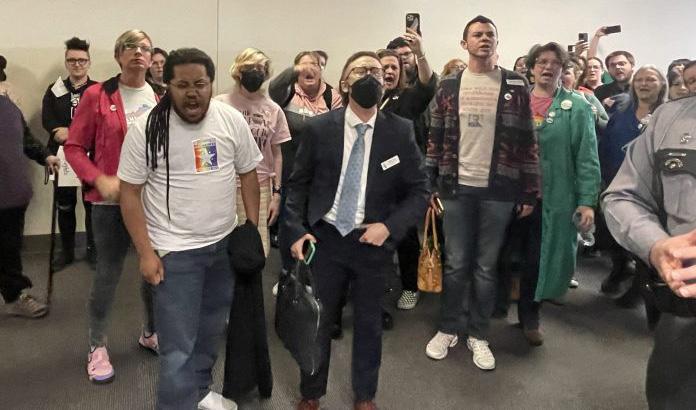
3 minute read
GOP legislators take aim at drag shows, health services for LGBTQ
BY NATHAN GRANGER, MARK PAYNE | LINK nky REPORTERS
While one bill aims to criminalize drag shows in Kentucky, another bill moving through the legislature seeks to eliminate transition services for transgender youth and penalize the doctors who grant them.
House Bill 470 limits medical services tied to gender transition therapy for minors. Under the bill, doctors who provide these services are at risk of losing their license but are not subject to criminal charges. The legislation also prohibits youth from legally changing their name or birth certificate if the change is tied to a gender transition.
During a House Judicial Committee meeting, Chris Hartman, the executive director of the Fairness Campaign, testified at the capitol and said the government has tried to criminalize the LGBTQ community and failed.
“You did not stop us from forming our beautiful and perfect families when you denied us the right to marry and to adopt children, and you will not erase us today,” Hartman said.
Bill sponsor Rep. Jennifer Decker (R-Waddy) said she filed the legislation to protect children from “irreparable change.”
Luka Hein, who detransitioned, said she received a double mastectomy and hormone therapy at 16 and urged the committee to vote in favor of the bill.
“I was affirmed on a path of medical intervention that I could not fully understand the long-term impacts and consequences of nor fully consent to use it with my age and mental health,” Hein said.
The bill passed the House 75-22. In committee, Northern Kentucky legislators Rep. Kim Moser (R-Taylor Mill) and Rep. Stephanie Dietz (R-Edgewood) voted against the measure while NKY Reps. Steve Rawlings (R-Burlington), Marianne Proctor (R-Union), Savannah Maddox (R-Dry Ridge), and Steve Doan (R-Erlanger) voted in favor of the bill.
Opponents argue the bill takes away potentially life-saving services from a population already at a higher risk of suicide and self-harm. The Trevor Project, a nonprofit dedicated to raising awareness and preventing suicide among LGBTQ youth, notes that suicide is the second leading cause of death among young people ages 10 to 24, and LGBTQ youth “are at significantly increased risk.” They are “more than four times as likely to attempt suicide than their peers.”
Decker said there is no “quality long-term study” that establishes long-term benefit to gender transition services.
After it passed committee, opponents of the bill lined the halls of the capitol chanting “shame” at legislators. When it passed on the House floor, Moser said the eyes of the world were on Kentucky.
“I would like to say to the rest of the world that’s watching Kentucky — we are not complete neanderthals,” Moser said.
Meanwhile, Senate Bill 115 is a revised bill, which aims to ban drag shows by preventing businesses from holding drag performances within 1,000 feet of schools, residences, recreation centers, places of worship and a variety of other establishments.
The bill would empower the state’s attorney general, county attorneys and individual citizens to bring a lawsuit against a business that operates in violation of the law. It would also apply the same treatment to other enterprises it views as harmful to children, including adult cabarets, escort services, adult movie theaters and shops selling sexually explicit materials.
The Covington Human Rights Commission is petitioning local leaders to oppose the bill.
On March 2, they unanimously decided to study the bill and petition both the Covington City Commission and the Kentucky Commission on Human Rights to oppose it and any future attempts by the state government to regulate drag shows.
Their petition will appear in the form of a letter. Although the commission has no official legislative power, it can make recommendations and petitions to law-making bodies.
Commission members determined that the argument for local control of drag performances, rather than state control, was the best way to make their case.
Commission members aren’t the only ones critical of SB 115.
“I can’t begin to describe how wrong-headed and ill-advised this legislation is, and how much of an overreach it is,” Covington Mayor Joe Meyer said in a Feb. 15 press release. “The courts have consistently restricted the government’s authority to regulate expression such as this.”
The 1,000-foot restrictions on the bill would make it very difficult, if not impossible, for someone to legally operate any fixed establishment where drag shows regularly occur in populated areas. It would also arguably prevent the operations of gay pride events and other public events associated with drag performances.
“What is the harm that is being done to anyone?” asked Commission Member John Fisher. “It says that they are protecting children. I don’t know where any children have been harmed by any of this.”








